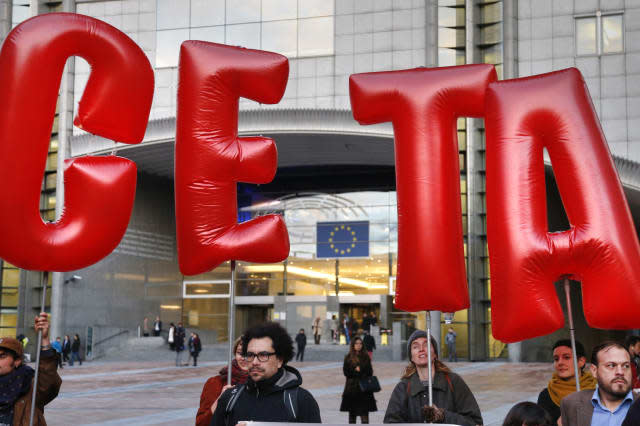EU steps up efforts to save Canada trade deal

Frantic diplomatic efforts to save the proposed EU-Canada trade pact continued with the president of the European Parliament attempting to prevent the collapse of the deal
Canada's international trade minister walked out of talks aimed at keeping the deal alive on Friday, labelling the situation "impossible" and casting doubt on the bloc's ability to operate effectively after the proposals were blocked by a regional administration in Belgium.
The parliament in Wallonia is holding up the deal, but the region's leader suggested the standoff could be resolved within days.
"I think it's worth taking a little more time," Walloon leader Paul Magnette said after crisis talks with European Parliament president Martin Schulz aimed at breaking the deadlock over the deal, which has taken years to thrash out with Ottawa.
Mr Schulz told reporters: "To my eyes, there is no problem we cannot resolve."
Supporters of Brexit have long highlighted the glacial pace of EU trade negotiations as a reason to leave, claiming that bilateral deals between the UK and other countries would be far simpler to sign.
But those in favour of retaining close trade links with Europe warned that the problems being experienced by Canada could be an omen for the tortuous negotiations the UK will face in thrashing out a post-Brexit agreement with Brussels.
Tory MP Andrew Murrison, who campaigned for Brexit, said: "This is precisely why the EU as a trade bloc will fail and why UK is right to leave."
His fellow backbencher James Cleverley said: "The population of the EU is 500 million people, Canada has 36 million and the governments of both wanted a trade deal. It has been seven years in the making but was scuppered by Wallonia regional government in Belgium. Wallonia has a population of 3.6 million people.
"This collapse goes to the heart of the EU's problem."
He suggested that post-Brexit the UK could pick up the basis of the proposed Canadian deal, known as CETA, and the similarly troubled TTIP agreement with the USA and "sign them off".
Conservative MEP Daniel Hannan said: "How odd that the EU's inability to agree a trade deal with Canada is used as an argument against Brexit. We can now have a bilateral FTA (free trade agreement)."
But Labour MP Ian Austin said: "The EU-Canada trade deal is in crisis and the Canadians have walked out, which shows how tough these things are."
His Labour colleague Steve Reed tweeted: "Belgian province blocks EU-Canada trade deal, any tiny EU country can do same to UK thx to Brexit."
The Walloons have concerns that the Ceta deal would undermine labour, environment and consumer standards and allow multinationals to crush local firms.
Mr Magnette said there were still "some small difficulties" over the pact that would create the world's biggest trading bloc and had been thought to be a done deal, expected to be signed at an EU-Canada summit planned for Thursday.
Canada's international trade minister Chrystia Freeland walked away from the talks Friday on the verge of tears, saying: "I think it's impossible."
The pact needs unanimous support within the EU, and Belgium in turn needs unanimity among its regions.
"It seems that for me, and for Canada, that the EU is not capable now to have an international deal, even with a nation with such European values like Canada," Ms Freeland said.
Prime Minister Theresa May has backed the proposed CETA deal but insisted that the UK was not seeking an agreement along the same lines after Brexit.
At her first European Council summit in Brussels on Friday, Mrs May said: "On CETA, obviously, as you're aware, the Walloon Parliament has been looking at this particular issue.
"I understand that discussions are continuing and negotiations are continuing. I think that it's important that the EU is able to sign this trade deal with Canada."
But she added: "From the UK's point of view, we're not looking to replicate a model that another country has. We're not looking to adopt another model that somebody else has in relation to their trade with the European Union.
"What we want is to develop what is a new relationship for the UK when we're outside the EU. What we want is to ensure that we have the right deal for the United Kingdom.
"And I'm optimistic about that. Obviously, we've got negotiations ahead of ourselves. Those negotiations will take time, as I say, there will be some difficult moments.
"It will need some give and take. But I'm optimistic that we can achieve a deal that is right for the UK because I actually think the deal that's right for the UK will also be right for the European Union."


